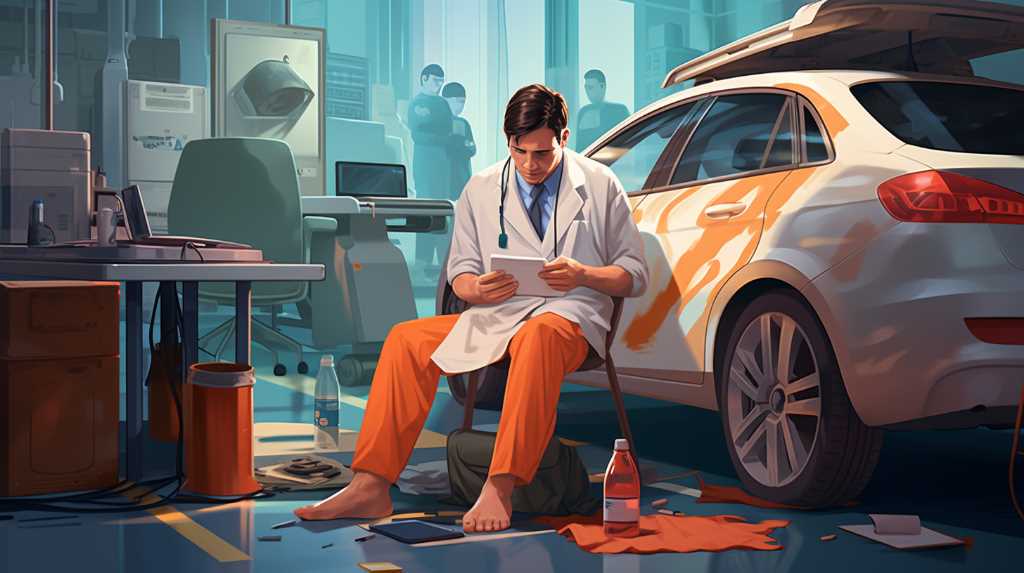
If your leg hurts after being in a car crash, it’s important to see a doctor right away. The pain could mean your leg is injured, and a doctor can figure out what’s wrong and start the right treatment. This is key for getting better and for recording your injuries, which could matter if you need to deal with legal matters or insurance claims later on.
The injuries might be small, like a bruise, or big, like a broken bone, and each one needs its own way of being treated to heal properly. Knowing exactly how your leg is hurt is crucial for taking care of yourself and for any paperwork you might need to fill out later.
It might also be a good idea to talk to a lawyer to make sure you get any money you should for your injuries, according to the law.
Seek Immediate Medical Attention
If you’re feeling leg pain after a car crash, it’s important to get checked by a doctor right away. Car crashes can cause serious injuries to your muscles and bones, like breaks or blood clots, which can be dangerous if not treated quickly.
Doctors might use X-rays or other scans to see what’s wrong. Getting help early can stop worse problems from happening and help you get better faster.
Document Your Symptoms
Symptom documentation, a crucial step in post-accident care, involves recording the onset, duration, and intensity of your leg pain for accurate diagnosis and treatment planning. Meticulously detailing the characteristics of your leg pain can provide healthcare professionals with vital information that may influence clinical decisions. It is advisable to note the exact location of the pain, any aggravating or alleviating factors, and its impact on your mobility and daily activities.
The use of a pain scale, where zero represents no pain and ten signifies the worst pain imaginable, allows for a quantifiable assessment that can be effectively communicated to your physician. This systematic approach ensures that subtle changes in symptoms are not overlooked, which is essential for monitoring progression and response to treatment.
Understand Potential Injuries
In the aftermath of a car accident, comprehending the nature of potential leg injuries is imperative for effective medical intervention and recovery. Traumatic forces exerted during vehicular collisions can result in a spectrum of musculoskeletal and vascular injuries to the lower extremities. Commonly, these include bone fractures, particularly of the femur, tibia, and fibula, as well as soft tissue damage such as muscle strains, ligament sprains, and contusions.
Moreover, dislocations of the knee or hip joints, and compartment syndromes, where swelling leads to increased pressure within a closed muscle space, are clinical concerns. Prompt diagnostic imaging and assessment are crucial for identifying the extent of injury, which can range from minor to severe, potentially requiring surgical intervention. Early and accurate diagnosis enhances the prognosis and informs a targeted treatment strategy.
Follow a Treatment Plan
If you’ve hurt your leg in an accident, it’s really important to follow the treatment your doctors have set out for you. This will help you heal the best you can. Your treatment might include taking medicine to help with the pain, doing certain exercises to help you move better, or even having surgery if the damage to your leg is really bad.
Going to all your check-ups lets your doctors see how you’re doing and change your treatment if necessary. People who really stick to their treatment plans often end up doing better.
Consider Legal Consultation
If you’re dealing with leg pain after a car crash, it’s a good idea to talk to a lawyer about possibly getting paid for your injuries. Your leg could be hurt from a hard hit, something poking into it, or twisting in a way it shouldn’t during the crash. This can cause broken bones, joints out of place, or damage to muscles and other soft parts.
To make a legal claim, you need to show proof of these injuries, prove they came from the crash, and explain how they’ve made your life harder.
Talking to a lawyer can help you understand your rights, who’s responsible, and how to go about asking for money for your troubles. Lawyers who know a lot about personal injury cases can help deal with the tricky parts of dealing with insurance and going to court if needed. They usually get paid only if they win money for you.
Remember: It’s important to act quickly after an accident to document your injuries and get the legal help you need. A lawyer can guide you through each step and fight for the compensation you deserve.
Conclusion
If you’re feeling leg pain after being in a car accident, it’s important to see a doctor right away to find out how bad your injuries are. Writing down all your symptoms clearly can help your doctor understand your situation better.
Knowing what injuries you might have helps you make smart choices about your treatment. It’s really important to follow the treatment plan your doctor gives you to heal properly.
Sometimes, you might also need to talk to a lawyer to help you get compensated for your injuries. This way, you’re taking care of both your health and any legal matters after your accident.